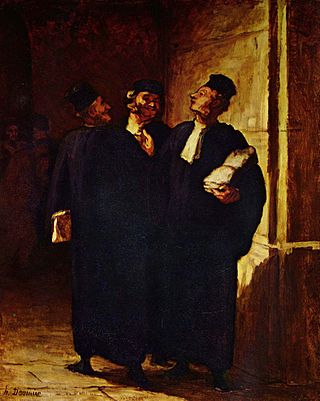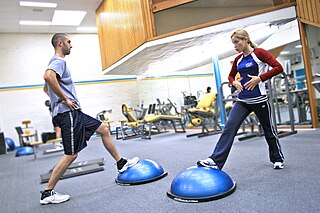
The Blue Badge tourist guide is a guide who has been certified as a qualified and accredited guide for tourists in the United Kingdom. [1]

The Blue Badge tourist guide is a guide who has been certified as a qualified and accredited guide for tourists in the United Kingdom. [1]
The initial certifying organization, originally called the Guild of Guide Lecturers, was founded to identify qualified tourist guides for the Festival of Britain in 1951. After being renamed several times, it became the Guild of Registered Tourist Guides and more recently the British Guild of Tourist Guides. [1] In 2002, the Institute of Tourist Guiding was established to accredit tourist guide training programmes, assess qualifications and language proficiency, accredit trainers, and award badges. [2] [3]
The Institute of Tourist Guiding examines and accredits guides in England. In Scotland, the Scottish Tourist Guides Association (STGA) sets the standards and accredits all the training courses. All Blue Badge guides must pass the Institute's exams or the STGA's exams. They study for up to two years at university level, taking a comprehensive series of written and practical exams which qualify them to become Blue Badge Tourist Guides. [4]
To qualify, potential guides must complete an extensive curriculum and pass exams. [1] The Institute of Tourist Guiding awards three different badges: [5]

An accountant is a practitioner of accounting or accountancy. Accountants who have demonstrated competency through their professional associations' certification exams are certified to use titles such as Chartered Accountant, Chartered Certified Accountant or Certified Public Accountant, or Registered Public Accountant. Such professionals are granted certain responsibilities by statute, such as the ability to certify an organization's financial statements, and may be held liable for professional misconduct. Non-qualified accountants may be employed by a qualified accountant, or may work independently without statutory privileges and obligations.

An advocate is a professional in the field of law. Different countries and legal systems use the term with somewhat differing meanings. The broad equivalent in many English law–based jurisdictions could be a barrister or a solicitor. However, in Scottish, Manx, South African, Italian, French, Spanish, Portuguese, Scandinavian, Polish, Israeli, South Asian and South American jurisdictions, "advocate" indicates a lawyer of superior classification.

A personal trainer is an individual who creates and delivers safe and effective exercise programs for healthy individuals and groups, or those with medical clearance to exercise. They motivate clients by collaborating to set goals, providing meaningful feedback, and by being a reliable source for accountability. Trainers also conduct a variety of assessments beginning with a preparticipation health-screening and may also include assessments of posture and movement, flexibility, balance, core function, cardio-respiratory fitness, muscular fitness, body composition, and skill-related parameters to observe and gather relevant information needed to develop an effective exercise program and support client goal attainment.

A stockbroker is an individual or company that buys and sells stocks and other investments for a financial market participant in return for a commission, markup, or fee. In most countries they are regulated as a broker or broker-dealer and may need to hold a relevant license and may be a member of a stock exchange. They generally act as a financial advisor and investment manager. In this case they may also be licensed as a financial adviser such as a registered investment adviser.

A paralegal, also known as a legal assistant, or paralegal specialist is a legal professional who performs tasks that require knowledge of legal concepts but not the full expertise of a lawyer with an admission to practice law. The market for paralegals is broad, including consultancies, companies that have legal departments or that perform legislative and regulatory compliance activities in areas such as environment, labor, intellectual property, zoning, and tax. Legal offices and public bodies also have many paralegals in support activities using other titles outside of the standard titles used in the profession. There is a diverse array of work experiences attainable within the paralegal field, ranging between internship, entry-level, associate, junior, mid-senior, and senior level positions.
A patent attorney is an attorney who has the specialized qualifications necessary for representing clients in obtaining patents and acting in all matters and procedures relating to patent law and practice, such as filing patent applications and oppositions to granted patents.
The Submarine Warfare Insignia are worn by qualified submariners.
The Chartered Financial Analyst (CFA) program is a postgraduate professional certification offered internationally by the US-based CFA Institute to investment and financial professionals. The program teaches a wide range of subjects relating to advanced investment analysis—including business analysis, statistics, probability theory, fixed income, derivatives, economics, financial analysis, corporate finance, alternative investments, portfolio management—and provides a generalist knowledge of other areas of finance.

Founded in 1904, the Association of Chartered Certified Accountants (ACCA) is the global professional accounting body offering the Chartered Certified Accountant qualification (ACCA). It is the fourth-largest professional accounting body in the world, with 252,500 members and 526,000 future members. ACCA's headquarters are in London with principal administrative office in Glasgow. ACCA works through a network of over 110 offices and centres in 51 countries - with 346 Approved Learning Partners (ALP) and more than 7,600 Approved Employers worldwide, who provide employee development.
A clinical research associate (CRA), also called a clinical monitor or trial monitor, is a health-care professional who performs many activities related to medical research, particularly clinical trials. Clinical research associates work in various settings, such as pharmaceutical companies, medical research institutes and government agencies. Depending on the jurisdiction, different education and certification requirements may be necessary, although not usually required, to practice as a clinical research associate. The main tasks of the CRA are defined by good clinical practice guidelines for monitoring clinical trials, such as those elaborated by the International Council for Harmonisation of Technical Requirements for Pharmaceuticals for Human Use. A CRA would subsequently grow into a Feasibility Leader, Study Start up Leader, Project Manager, and Project Director at a Pharmaceutical company or a contract research organization. A CRA is usually required to possess an academic degree in Life Sciences and needs to have a good knowledge of good clinical practice and local regulations.

A tour guide (U.S.) or a tourist guide (European) is a person who provides assistance, and information on cultural, historical and contemporary heritage to people on organized sightseeing and individual clients at educational establishments, religious and historical sites such as; museums, and at various venues of tourist attraction resorts. Tour guides also take clients on outdoor guided trips. These trips include hiking, whitewater rafting, mountaineering, alpine climbing, rock climbing, ski and snowboarding in the backcountry, fishing, and biking.
An admission to practice law is acquired when a lawyer receives a license to practice law. In jurisdictions with two types of lawyer, as with barristers and solicitors, barristers must gain admission to the bar whereas for solicitors there are distinct practising certificates.
British qualified accountants are full voting members of United Kingdom professional bodies that evaluate individual experience and test competencies for accountants.
Following is a partial list of professional certifications in financial services, with an overview of the educational and continuing requirements for each; see Professional certification § Accountancy, auditing and finance and Category:Professional certification in finance for all articles.
Professional social workers are generally considered those who hold a professional degree in social work. In a number of countries and jurisdictions, registration or licensure of people working as social workers is required and there are mandated qualifications. In other places, the professional association sets academic and experiential requirements for admission to membership.

A certified teacher is an educator who has earned credentials from an authoritative source, such as a government's regulatory authority, an education department/ministry, a higher education institution, or a private body. This teacher qualification gives a teacher authorization to teach and grade in pre-schools, primary or secondary education in countries, schools, content areas or curricula where authorization is required. While many authorizing entities require student teaching experience before earning teacher certification, routes vary from country to country.
The Association of International Accountants (AIA) is a professional accountancy body. It was founded in the UK in 1928 and since that date has promoted the concept of ‘international accounting’ to create a global network of accountants in over 85 countries worldwide.
Professional requirements for architects vary from place to place, but usually consist of three elements: a university degree or advanced education, a period of internship or training in an office, and examination for registration with a jurisdiction.

An Coimisiún Le Rincí Gaelacha is the oldest and largest governing body for competitive Irish step dancing globally. Founded in 1927, CLRG is responsible for creating a standardised system of Irish dance, music and competition for its member organisations in 26 countries. It organises Oireachtas Rince na Cruinne as well as Oireachtas Rince na hÉireann, and is the central authority for teacher and adjudicator accreditation. It is headquartered in Dublin, Ireland.